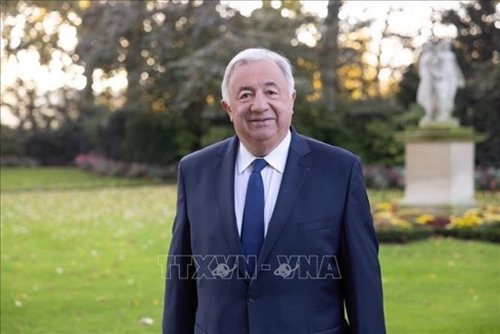Larcher made the statement in an interview granted to Vietnam New Agency ahead of his trip, from December 8-9, which will be the first visit to Vietnam by a French Senate President since 2008.
It will also be his first Asian trip since he was re-elected as President of the Senate in 2014, Larcher said, noting that the selection of Vietnam for the visit was not random but came from the intensive relationship between two countries that share future cooperation prospects.
The visit marks the resumption of contact at the highest level between the two countries after the COVID-19 pandemic, and following the official visit to France by Prime Minister Pham Minh Chinh in November 2021, he continued.
According to the Senate President, he and National Assembly Chairman Vuong Dinh Hue are scheduled to launch activities celebrating the 50th anniversary of bilateral diplomatic ties.
Currently, French representative diplomatic offices and their Vietnamese partners are working together to organize celebration activities in 2023 with highlights including exhibitions, festivals, meetings and political and diplomatic events, and Larcher stressed that his visit is at the start of a year expected to be full of diverse and effective activities.
Larcher expressed his hope that he and N.A. Chairman Vuong Dinh Hue and other leaders of Vietnam will hold discussions to seek ways to consolidate their bilateral legislative ties.
    |
 |
|
President of the French Senate Gérard Larcher |
During his stay in Hanoi, the Senate President will attend the inauguration ceremony of a new facility of the French Institute in the capital, and visit the construction site of metro line No.3, about to be put into service in the city, and other urban planning and heritage conservation projects which France is implementing or engaging in.
He will also visit relic sites in Hanoi, and meet with French people and businesses in Vietnam.
Vietnam–France cooperation relations have become more concrete and are meeting common priorities, Larcher said, affirming that this was thanks to the common efforts of both countries.
The two countries have worked hard towards modernity through science and technology, and are paying special attention to promoting future fields such as space, clean and renewable energy, and traffic, he said.
French companies participating in projects in Vietnam always show trust and fairness in sharing values and economic benefits, and ensure sustainability and quality, he noted.
Vietnam always receives support from France at important times, he stated, adding that France is one of the strongest advocates for the E.U.-Vietnam Free Trade Agreement to come into effect.
France highly values Vietnam’s outstanding role in ASEAN, especially when the Southeast Asian nation assumed the ASEAN Chair in 2020, he went on.
France is proud to have accompanied Vietnam over 50 years on its path to progress, he said, citing the educational partnership between the two countries as a successful example with university projects in science and technology, management and engineering.
As many as 3,000 Vietnamese doctors have been trained in France. When the COVID-19 pandemic broke out, Vietnam promptly provided masks to France, while France also met Vietnam’s demand for vaccines.
Vietnam and France also share similarities and mutual influence on heritage, cuisine and lifestyle, he noted.
Over the past 50 years, the two countries have enjoyed a relationship of sharing and trust, respecting sovereignty and differences, Larcher said.
Mentioning what the two countries should do to further optimize their potential and overcome challenges to bolster their strategic partnership, Larcher said that France and Vietnam share principles in international relations, which are the compliance of international law, the settlement of disputes by peaceful measures and dialogue, and multilateralization.
France has many interests and reasons to contribute to the stability of the Indo-Pacific region, especially freedom of navigation, he said, stressing France's unwavering commitment to the principles of freedom of navigation and overflight, which Vietnam and many countries in the East Sea (South China Sea) share. As Vietnam assumes increasing responsibilities in the international arena, and the Indo-Pacific region is becoming increasingly strategically important, the strengthening of cooperation between Vietnam and France in this area is becoming an urgent priority, he stated.
He emphasized that the two sides should initially work together to mobilize resources to limit the scale and overcome the consequences of climate change.
The French Development Agency (AFD) is currently assisting the implementation of a number of climate change adaptation projects such as conservation of the banks and deltas of the Mekong and Red Rivers. The AFD and Electricity of France (EDF) are also collaborating with the Vietnam Electricity (EVN) on an energy transition effort, which is in line with the commitments made by Prime Minister Pham Minh Chinh at the 26th U.N. Climate Conference (COP26), he noted.
The French Senate leader also suggested a number of areas that the two sides can continue to cooperate in, including culture and heritage, education-training, healthcare, law, research, and space.
In the immediate future, the two countries should work together to upgrade Long Bien Bridge, he added.
Regarding the parliamentary partnership between the two countries, Larcher said that the collaboration plays an important role in relations between the two countries, which has contributed to strengthening of dialogue and mutual understanding between their nations.
He said he hopes parliamentary cooperation will continue to be promoted and expanded to areas of mutual interest such as healthcare, sustainable development, environment and social policies.
He said that during his visit, he hopes to highlight the connectivity between the local administration of France and its Vietnamese partners, underlining that partnerships between localities is one of the key pillars of France-Vietnam relations which has produced important results, including cooperation between Hanoi and the Ile de France region and Toulouse metropolitan area in restoring historical streets and urban management and development; ties between Lao Cai and the New Aquitaine region in tourism, and bilateral collaboration in French teaching.
Source: VNA